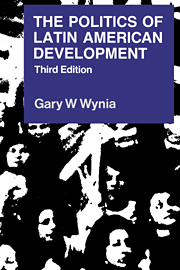Book contents
- Frontmatter
- Contents
- List of maps and tables
- Preface to the third edition
- Preface to the second edition
- Preface to the first edition
- Map 1 Latin America
- Map 2 Per capita gross domestic products 1987, measured in 1986 U.S. dollars. (Source: Inter-American Development Bank, Economic and Social Progress in Latin America, 1988, p. 540.)
- Part I Understanding Latin American politics
- Part II The political games played in Latin America
- 6 Mexico: Whose game is it?
- 7 Chile: democracy destroyed
- 8 Venezuela: democracy preserved
- 9 Brazil: populists, authoritarians, and democrats
- 10 Argentina: populists, authoritarians, and democrats
- 11 Cuba: a communist revolution
- 12 Nicaragua: revolution the Sandinista way
- Appendix: Tables
- Index
10 - Argentina: populists, authoritarians, and democrats
Published online by Cambridge University Press: 20 October 2009
- Frontmatter
- Contents
- List of maps and tables
- Preface to the third edition
- Preface to the second edition
- Preface to the first edition
- Map 1 Latin America
- Map 2 Per capita gross domestic products 1987, measured in 1986 U.S. dollars. (Source: Inter-American Development Bank, Economic and Social Progress in Latin America, 1988, p. 540.)
- Part I Understanding Latin American politics
- Part II The political games played in Latin America
- 6 Mexico: Whose game is it?
- 7 Chile: democracy destroyed
- 8 Venezuela: democracy preserved
- 9 Brazil: populists, authoritarians, and democrats
- 10 Argentina: populists, authoritarians, and democrats
- 11 Cuba: a communist revolution
- 12 Nicaragua: revolution the Sandinista way
- Appendix: Tables
- Index
Summary
Argentina differs from Brazil in several ways. Brazil was a Portuguese colony and Argentina a Spanish one. Brazil is much larger, its population four times greater, more ethnically diverse, and poorer on the average than Argentina's. Yet Argentina also tried military authoritarianism, not once but twice between 1966 and 1983, after a decade of populism that was far more profound than Brazil's and certainly more enduring thanks to the adroit leadership of General Juan Domingo Perón who ruled Argentina for ten years immediately after World War II.
In 1966, two years after the Brazilian experiment in military authoritarianism began, the Argentine armed forces did likewise. But the Argentine venture lasted only seven years before new elections were held. However, the military's retreat was brief, and after three years of Peronist government, they took control once more in 1976, this time ruthlessly unleashing an assault on the Argentine people that left over 8,000 dead, nearly all of them secretly seized and killed by military security forces in civilian dress. Yet, as before, the military government lasted just seven years, this time forced out by its own embarrassment from defeat by the British in a war over the Falkland/Malvinas Islands. Then, simultaneous with the Brazilians, the Argentines began a transition to constitutional government, spending the rest of the 1980s reeducating themselves in democratic politics.
The Argentine experience raises many questions. Why, for example, did populist Juan Perón change his nation's politics more than Vargas did his, and how did he do it?
- Type
- Chapter
- Information
- The Politics of Latin American Development , pp. 249 - 283Publisher: Cambridge University PressPrint publication year: 1990



